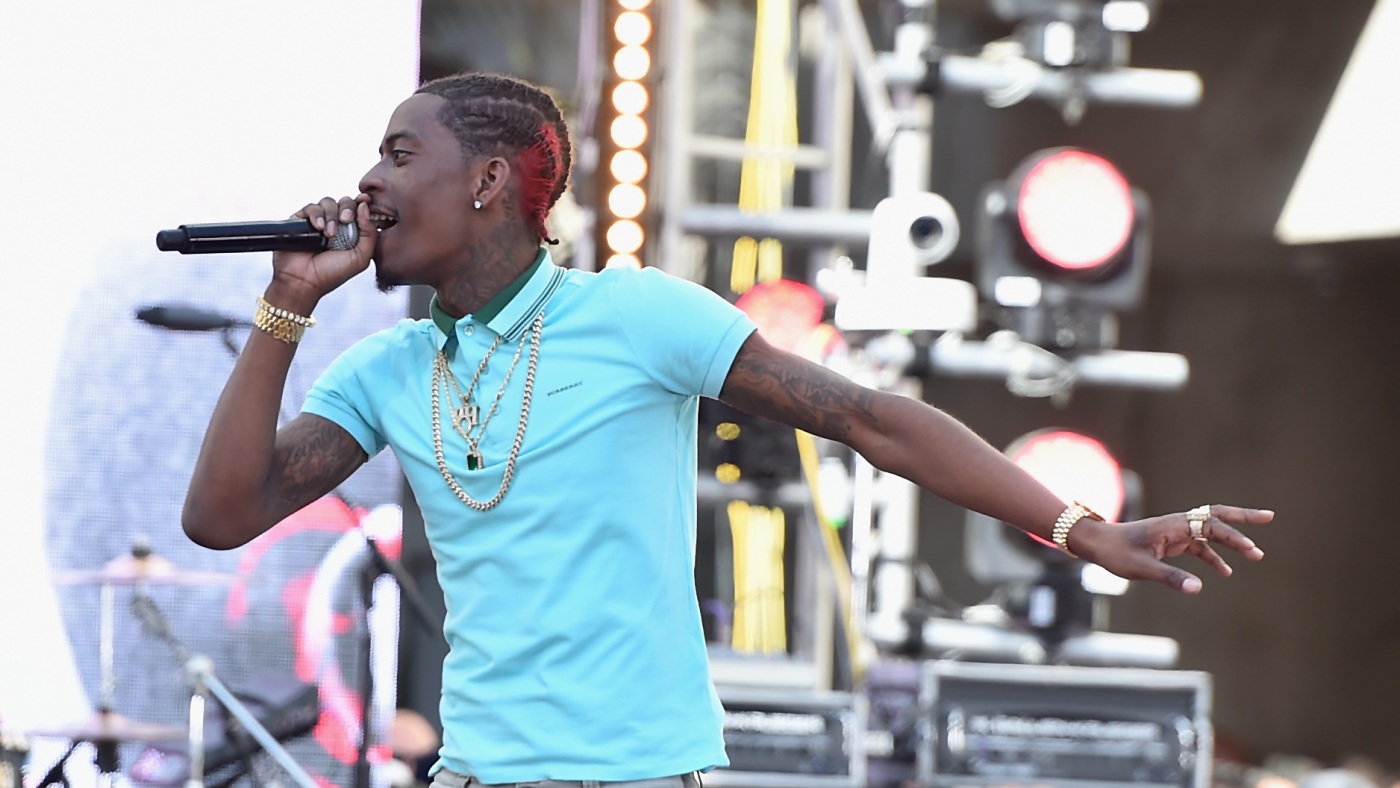Rapper Rich Homie Quan performs in Hollywood, Calif. on April 1, 2015. That year, he had his biggest hit, “Flex (Ooh, Ooh, Ooh).”
Alberto E. Rodriguez/Getty Images
hide caption
toggle caption
Alberto E. Rodriguez/Getty Images
Rich Homie Quan, an Atlanta native who was instrumental in that city’s takeover of hip-hop’s sound and attitude in the mid 2010s, has died. The rapper’s rapid ascent, alongside peers like Young Thug, with whom he partnered in the group Rich Gang, resulted in a string of hits that switched rap’s lingua franca from staccato rhythms to melodic flows. His death was confirmed to NPR by his father, Corey Lamar, who did not provide a cause of death. He was 34.
When a beloved artist dies, it’s almost impossible to boil their life down to a handful of Billboard Hot 100-charting hits. And Rich Homie stamped his imprint onto plenty of them — seven to be exact — all within a two-year blitz between 2013 and 2015 that took him from scrappy unknown to an inescapable force in the industry. They read like the roll call of an era when Atlanta rap overtook the sound of pop and made him the industry’s cleanup hitter: “Type of Way,” YG’s “My Hitta,” Rich Gang’s “Lifestyle,” “Walk Thru,” “Flex (Ooh, Ooh, Ooh),” the Fast and Furious franchise’s “Ride Out,” even Lil Dicky’s “Save Dat Money.”
A son of East Atlanta, Quan quietly cultivated his talent for years in his mother’s basement and even during a short prison stint before exploding onto the charts almost overnight. From the beginning, Quan fought to distinguish himself in a city full of young hopefuls. He connected with “Differences,” a song from his 2012 mixtape Still Going In, that showcased his hunger and made him one to watch. He quickly became a hitmaker, crafting undeniable street anthems. And he stood at the forefront of a wave that challenged and changed the sound of hip-hop and, by extension, American music.
Atlanta’s rap scene had been on the rise for a couple of decades before Rich Homie Quan came along. But his emergence coincided with the city cementing its identity as an undisputed hip-hop mecca. Along with other Atlanta contemporaries, like Future and Thug, Quan came to define a new generation of post-OutKast ATLiens — equal parts street-hardened, plaintive and psychedelic in sound and style. While regional rappers — West Coast stalwarts and early Southern disruptors alike — had always dabbled in sing-songy delivery, Quan and his ilk captured an era in which technological advances in recording allowed them to freestyle or “punch in” their melodic flows, untethered by pad and pen. The resulting sound reached new prominence with the release of Rich Gang Tha Tour Pt .1, a mixtape that coupled Quan and Thug together with Birdman of Cash Money/Young Money fame on songs such as their 2014 opus, “Lifestyle,” which found them voicing their rawest desires in voices so vulnerable they almost belied their explicit intentions. The duo set a new blueprint for one-off pairings but success was short-lived, quickly supplanted by clashing egos as money and fame disrupted their magical bond.
Quan’s story is one of wild success and timeless impact, but it also reflects how industry ups-and-downs can wring young talents dry as quick as they come up. His impasse with Thug became a harbinger of travails for Quan, who filed suit against his record label Think It’s a Game Records over unpaid royalties in 2016. The legal battles, though eventually settled, sapped Quan of his creative output at the height of his career. For two years he went silent before returning in 2017 with a mixtape, followed by a debut studio album, Rich As In Spirit, that signaled a transformation. Though the landscape Quan returned to had been shaped largely by his sonic influence, he found himself changed, too, his street-hardened edge replaced by a more mature, reflective sound.
In Young Thug’s ongoing gang conspiracy trial, Rich Homie Quan has been included in the prosecution’s legal narrative due to a shooting that took place at a barbershop owned by Quan’s father. His father was reportedly injured in the shooting, though Quan had downplayed the event in recent interviews.
While promoting his 2022 release Family & Mula, he frequently talked about the overwhelming stress that came with balancing early success and the crash that came with legal pitfalls, growing drug use and the stalling of his creative output. “I had a dark cloud over my head,” he said on Math Hoffa’s hip-hop podcast My Expert Opinion. “I probably was the lowest I was in my life.” Speaking five years after that low point, with dependency behind him, he sounded clear-headed — both about his musical future and how his absence had revealed his lasting impact on the game. Though he never returned to his former glory, Rich Homie Quan crooned his way to the top by putting on for the bottom. No man can outlive a legacy that rich.

